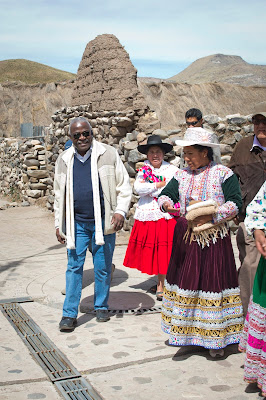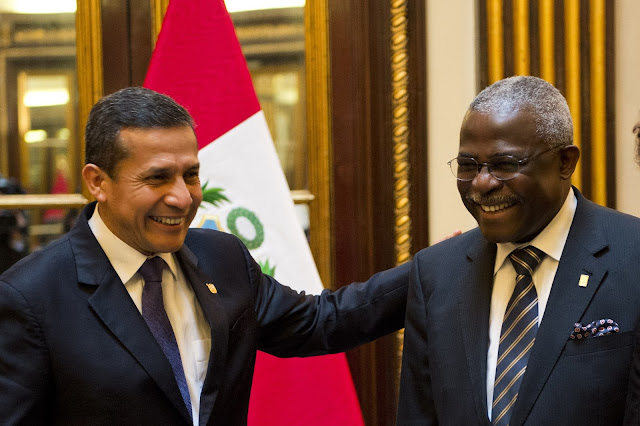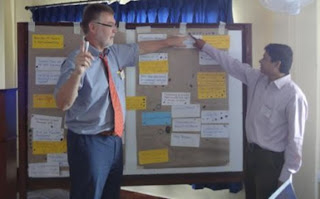Pass On What You Have Learned, ESA Projects Urged
By Betty MwakelemuTole, Documentation and Learning Officer, IFADAFRICA
The four-day IFADAFRICA East and Southern Africa (ESA) Annual Knowledge Management Workshop held in Nairobi, Kenya, drew to a close on the evening of 16 August 2013. Helen Gillman, IFAD’s Knowledge Management Coordinator in her closing remarks, captured the mood of the workshop. “We now understand knowledge management and learning is about changing the way we work in order to achieve results. Take your commitment to monitor, assess and document what you are doing seriously, and pass on what you have learned,” said Ms. Gillman. Ninety-five Project Coordinators, Monitoring and Evaluation (M&E), Knowledge Management and Communication Officers of over 40 IFAD-supported projects, as well as few government and IFAD Country Programme Officers from ESA region attended the workshop. The workshop was facilitated by Jurgen Haggman and Edward Chuma, of PICOTEAM, and Miriam Cherogony, the IFADAFRICA Project Coordinator.
![]() |
| Narciso from RFSP, Mozambique presents his learning |
The workshop agenda gave project officers an opportunity to share their achievements and challenges in integrating knowledge management and learning (KM&L) in their projects in the last one year using mini workshops and open space. The methodologies used enabled other participants to learn, critique and understand what other projects were doing and also explore new ideas to address challenges in implementing KM&L. The projects reported increased awareness of project results amongst the target audience, enhanced focus on result-based M&E, integration of lessons learned in the formulation of Country Strategic Operational Plans (COSOP), increase in allocations towards KM&L activities in budgets and workplans, and mainstreaming of KM&L in the design of new projects, among other practices.
At both project, and country level (as members of the Country Programme Management Team of IFAD-supported projects), participants shared the challenges they are grappling with in mainstreaming KM&L in government, facilitating KM&L at grassroots level, making Communities of Practice (CoPs) work, setting up and managing a learning oriented M&E, developing capacity of KM&L, and documenting and disseminating knowledge. In groups, participants held discussions on how some of them have addressed these challenges and came up with new suggestions.
![]() |
| Aileen Ogolla of Practical Action shares their KM experience |
To enhance further understanding of KM&L, Jurgen Hagmann, Picoteam took the participants through the integrated knowledge management system, which highlights the five interconnected functions that form the foundation of KM&L system. These include learning and adaptation, monitoring and evaluation, internal and external communication, innovation and experimentation, and information management. In addition, the framework for putting KM&L into action, as outlines in the 11 cornerstones for integrating KM into projects and programmes was also discussed. Knowledge management partners, Practical Action and Arid Lands Information Network (ALIN) presented their work on the use of “Practical Answers” which is their focus on knowledge management and Maarifa Centres or community information centers respectively that provide knowledge harvesting at the local level. Elizabeth Ssendiwala, IFAD Regional Gender Specialist, ESA did presented on gender mainstreaming and use of KM using the case of Bukonzo Joint Cooperative in Western Uganda using visioning to address cross cutting issues of gender and land.
![]() |
Mosarwe from ASP, Botswana presents their action plan
|
Ms. Miriam Cherogony made a presentation on facilitating online CoPs. This was an important activity for IFADAFRICA, which will assist in the continued KM discussions in between the face to face meetings. Most of the CoPs discussion was drawn from the recent online facilitation training by Nancy White, Fullcirc focusing mainly on value proposition, tools and stewardship of the CoP. Edward Chuma, Picoteam led the participants in a discussion on KM strategy development. This was based on requests from a number of projects who have planned to undertake this activity in the coming months. Participants eventually developed country action plans for continuing implementation of KM&L.
Reflection and Way Forward
· Although there has been marked improvement in the understanding of KM&L among the projects there is still need for hand holding through coaching and mentoring to provide assurance that they are in the right direction.
· A number of projects are keen to pursue some sort of documentation of their experiences and are interested in support of institutions such as Practical Action and Arid Lands Information Network (ALIN) who demonstrated good hands on experience and possible linkage. IFADAFRICA will develop a documentation template to ensure proper harvesting and documentation of knowledge products for sharing and to populate the website (www.ifadafrica.org)
· The annual face to face meetings are too far in between to make them effective hence the need for the online facilitation and development of CoPs for the ongoing discussion. The priority areas focused on documentation, learning oriented M&E and KM at the community level.
· There is an urgent need to address the online facilitation platform to enable the CoPs to flourish. Several suggestions were put forward that the platform must be user friendly, interesting and linked to some of the attractive social media like Face book and tweeter.
![]() |
| Paulo from Mozambique leads participants in appreciation of presenters |
· The use of open space and mini workshops was very effective in getting the participants to share their experiences. In future this should be encouraged and primed properly to ensure interesting cases are shared. The invitation of other KM institutions such as ALIN and Practical Action added quite some flavor to the discussions.
· There was a strong push to develop some simple monitoring and evaluation indicators for KM&L to enable Projects and IFADAFRICA to know whether they making an impact or not. PICOTEAM promised to complete the KM&L Performance Framework started in Phase I to enable IFADAFRICA to select some key indicators to monitor KM&L at all levels. This will be discussed and shared with the projects.
· Due to time constraint the participants only managed to develop their country action plans. There is need to do immediate follow-up and ensure the project plans are completed. IFADAFRICA coaching and mentoring will be provided to ensure they are implemented.
· For IFADAFRICA to maximize the limited resources there is a strong case to focus on the new projects with both KM in the design and old staff from closed projects that are fully sensitized to ensure they mainstream KM&L.
· The commitment of the Country Programme Manager remains important to projects mainstreaming KM&L. IFADAFRICA to champion discussions with the CPMs and Regional technical experts based at the Regional Office to ensure we come up with a common strategy to ensure KM&L are supported to take root in projects and ensure results.


.jpg)

































